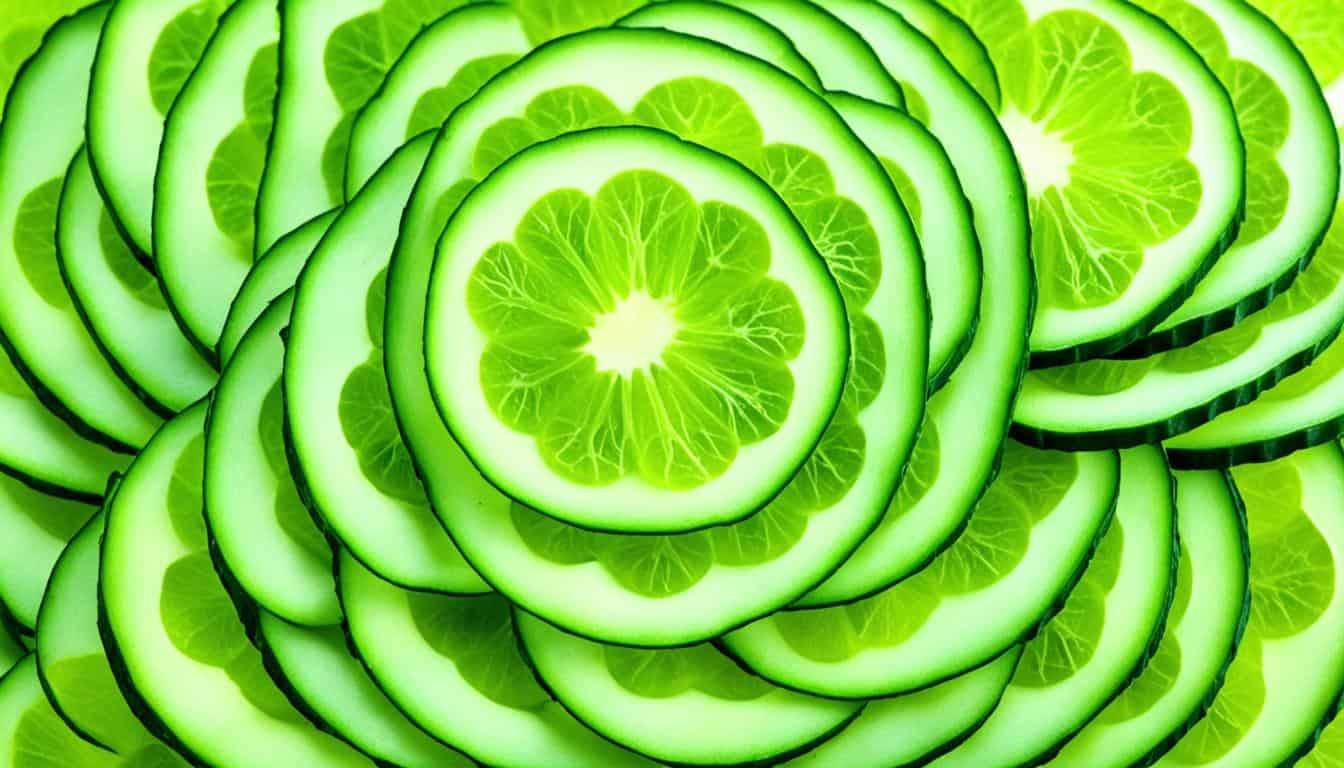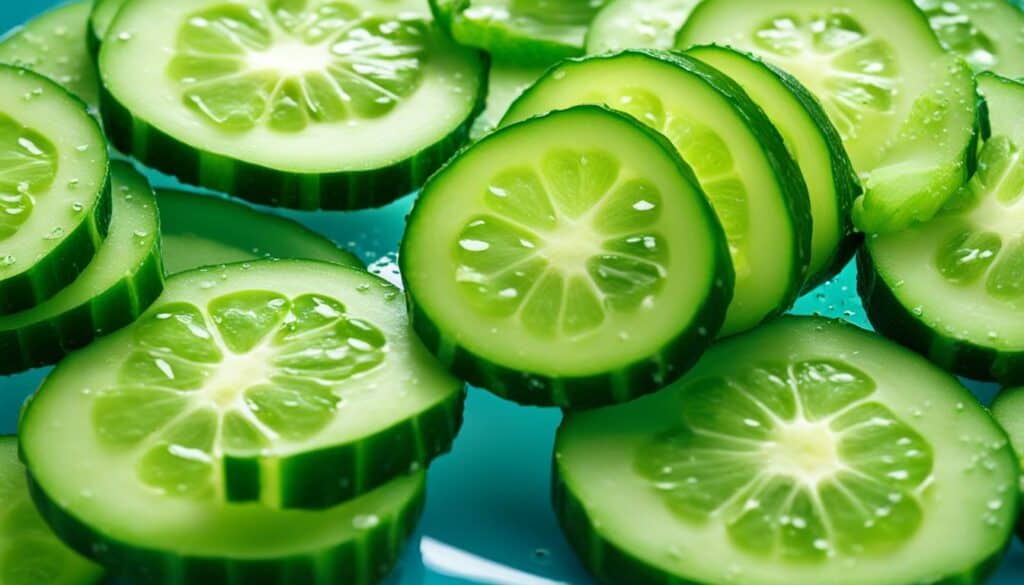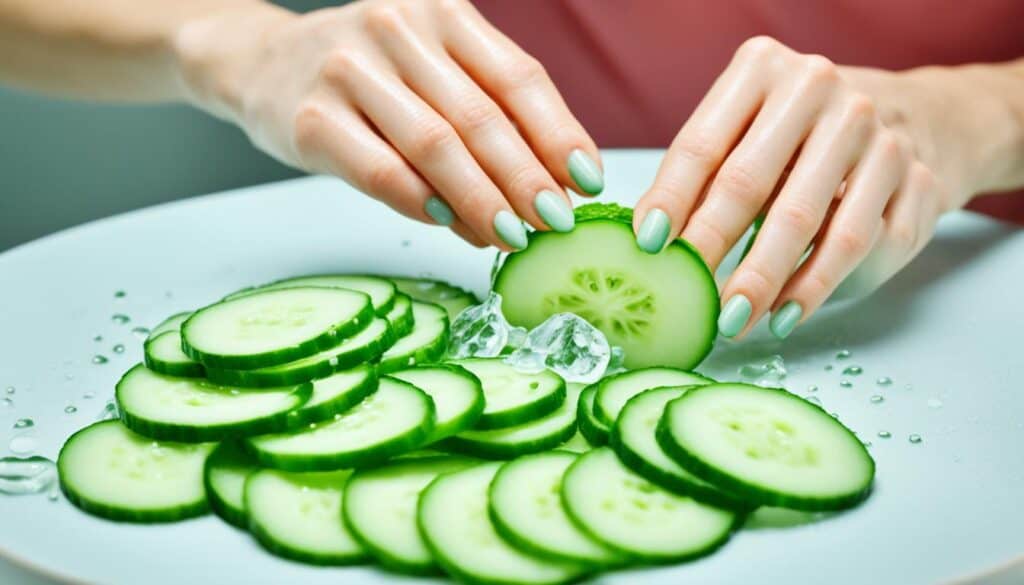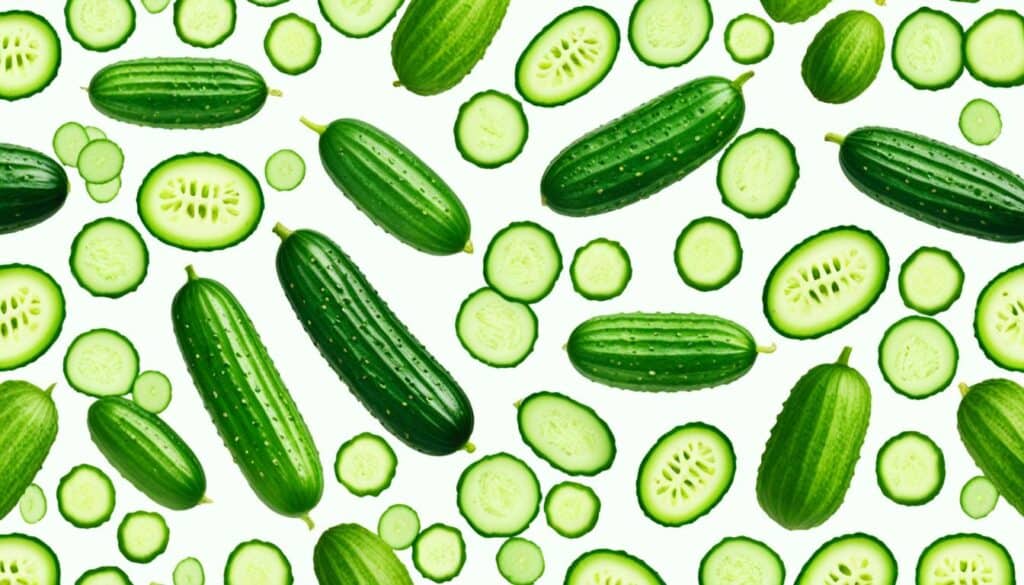Did you know that cucumbers are a fruit, not a vegetable? Despite their common association as a vegetable, cucumbers are actually classified as a fruit. This refreshing and hydrating fruit is not only delicious but also offers numerous health benefits that can enhance your daily diet.
Key Takeaways:
- Cucumbers are a fruit with high water content.
- They are low in calories and rich in important nutrients.
- Cucumbers can aid in hydration, weight loss, and skin health.
- They are versatile and can be included in various dishes.
- However, precautions should be taken for allergies and potential contamination.
Nutrient Content of Cucumbers
When it comes to nutritional value, cucumbers are a powerhouse. These nutrient-rich vegetables are not only low in calories but also packed with essential vitamins and minerals.
One unpeeled, raw cucumber weighing 10.62 ounces (301 grams) contains approximately:
| Nutrient | Amount per 301g Cucumber |
|---|---|
| Calories | 45 |
| Total Fat | 0.3g |
| Carbohydrates | 11g |
| Protein | 2g |
| Fiber | 1.5g |
In addition to these macronutrients, cucumbers are rich in important vitamins and minerals that contribute to overall health and well-being. Some of the key nutrients found in cucumbers include:
- Vitamin C
- Vitamin K
- Magnesium
- Potassium
- Manganese
These vitamins and minerals play a crucial role in supporting immune function, promoting bone health, regulating blood pressure, and maintaining optimal cellular function.
So, when you snack on a crunchy cucumber, you’re not only satisfying your taste buds but also giving your body a healthy dose of essential nutrients.
Expert Insight:
“Cucumbers are not just a hydrating and refreshing vegetable, but they also offer substantial nutritional benefits. With their low calorie content and abundant vitamins and minerals, cucumbers make a valuable addition to a well-rounded diet.” – Dr. Lisa Johnson, Nutritionist.
Antioxidant Benefits of Cucumbers
Cucumbers are not only refreshing but also offer a range of health benefits. One notable benefit is their antioxidant properties. Antioxidants play a crucial role in protecting our cells from damage caused by harmful free radicals. Cucumbers contain various antioxidants that can help in reducing the risk of chronic illnesses such as cancer, heart disease, lung disease, and autoimmune diseases.
Studies have shown that cucumbers can increase antioxidant activity in the body. In one study involving older adults, supplementation with cucumber powder resulted in elevated antioxidant levels. This suggests that consuming cucumbers can help boost the body’s defense against oxidative stress and its associated health risks.
Cucumbers are rich in compounds like flavonoids and tannins, which are known for their antioxidant properties. These compounds work by neutralizing free radicals and reducing oxidative damage to cells. Including cucumbers in your diet can contribute to overall cellular health and may help prevent the onset of chronic conditions linked to oxidative stress.
Cucumbers are a delicious and easy way to incorporate antioxidants into your daily diet. They can be enjoyed in salads, added to sandwiches, or simply eaten as a healthy snack. By including cucumbers as a source of antioxidants, you can nourish your body and support its natural defense mechanisms against harmful free radicals.
Beneficial Antioxidants Found in Cucumbers:
- Flavonoids
- Tannins
- Vitamin C
- Beta-carotene
These antioxidants work together to protect your cells from damage and promote overall health. Including a variety of fruits and vegetables in your diet, such as cucumbers, can provide a rich source of antioxidants to support your well-being.
Hydration Benefits of Cucumbers
Cucumbers are not only a refreshing and tasty addition to your meals but also have excellent hydration benefits. This is because cucumbers have a high water content, which is essential for supporting various bodily functions and overall well-being. Proper hydration is crucial for temperature regulation, nutrient transportation, and maintaining the balance of bodily fluids.
A study involving children found that increased fruit and vegetable intake, including cucumbers, improved hydration levels. The water content in cucumbers helps meet your daily fluid needs and can prevent dehydration, especially during hot weather or strenuous physical activity. In fact, cucumbers are composed of about 96% water, making them an excellent choice for promoting hydration.
Promoting Hydration with Cucumbers
Adding cucumbers to your diet is a simple and enjoyable way to stay hydrated throughout the day. Here are a few ways you can incorporate cucumbers to promote hydration:
- Include sliced cucumbers in your salads and sandwiches.
- Enjoy cucumber-infused water by adding slices of cucumber to a jug of water and letting it infuse for a refreshing taste.
- Prepare cucumber-based smoothies or juices for a hydrating and nutritious drink.
By including cucumbers in your daily meals and snacks, you can boost your hydration levels and support optimal bodily functions. Stay refreshed and nourished with this hydrating vegetable.
Weight Loss Benefits of Cucumbers
When it comes to weight loss, cucumbers are a fantastic addition to your diet. These refreshing vegetables are low in calories, making them a guilt-free choice for those looking to shed some pounds. In fact, one cup of cucumber contains just 16 calories, making it an excellent option for adding volume and crunch to your meals without packing on extra calories.
Not only are cucumbers low in calories, but they also have a high water content, which can aid in weight loss. Foods that are high in water and low in calories, like cucumbers, help to fill you up without adding excessive energy. This can help curb your appetite and prevent overeating, making it easier to maintain a calorie deficit, which is essential for weight loss.
Additionally, cucumbers are a great source of dietary fiber. Fiber adds bulk to your meals, promoting feelings of fullness and reducing hunger pangs. By including cucumbers in your diet, you’ll have a satisfying and nutritious option that can support your weight loss journey.
| Nutrient | Amount per 1 cup (104g) |
|---|---|
| Calories | 16 |
| Protein | 0.8g |
| Fat | 0.2g |
| Carbohydrates | 3.8g |
| Fiber | 0.6g |
| Potassium | 157mg |
| Vitamin C | 4.5mg |
| Vitamin K | 8.5µg |
As part of a well-balanced diet, cucumbers can contribute to your weight loss goals. Try incorporating them into your meals by adding sliced cucumbers to salads, blending them into refreshing smoothies, or enjoying them as a crunchy snack. The versatility of cucumbers makes it easy to find delicious and creative ways to include them in your weight loss journey.
Blood Sugar Regulation Benefits of Cucumbers
Cucumbers may help lower blood sugar levels and prevent complications of diabetes. Animal and test-tube studies have shown that cucumber extracts can reduce blood sugar levels. However, more research is needed to determine the impact on human blood sugar levels.
| Study | Findings |
|---|---|
| Animal Study 1 | Cucumber extract lowered blood sugar levels in diabetic mice by 50%. |
| Test-tube Study 1 | Cucumber extract increased insulin sensitivity in human liver cells. |
| Human Study 1 | Participants who consumed cucumber juice experienced a slight reduction in fasting blood sugar levels. |
While these preliminary findings are promising, it is important to note that the studies conducted so far have limitations, such as small sample sizes and varying methodologies. Further research with larger human trials is necessary to fully understand the potential effects of cucumbers on blood sugar regulation.
Managing Diabetes with Cucumbers
For individuals with diabetes, incorporating cucumbers into their management plan may offer additional benefits. Cucumbers have a low glycemic index, meaning they have a minimal impact on blood sugar levels. Including cucumbers in meals and snacks can help add volume and flavor without significantly affecting blood glucose levels. Additionally, the high water content of cucumbers can aid in hydration, which is essential for individuals with diabetes to maintain optimal blood sugar control.
Preventing Diabetes Complications with Cucumbers
Beyond blood sugar regulation, cucumbers can provide important nutrients that support overall health and reduce the risk of diabetes complications. Cucumbers are rich in fiber, which can help improve blood sugar control and lower the risk of heart disease, a common complication of diabetes. Furthermore, the antioxidants found in cucumbers may help protect against oxidative stress and inflammation, which are underlying factors in the development of diabetes-related complications.
Digestive Health Benefits of Cucumbers
Cucumbers offer numerous benefits for digestive health, helping to promote regular bowel movements, prevent constipation, and improve overall digestive function. These benefits can be attributed to the high water and fiber content of cucumbers.
The soluble fiber in cucumbers plays a crucial role in slowing down digestion, allowing for better nutrient absorption and promoting healthy bowel movements. Additionally, the water content in cucumbers keeps stools soft, making them easier to pass.
Cucumbers also contain pectin, a soluble fiber that can further enhance digestive health. Pectin increases bowel movement frequency and acts as a natural laxative, relieving constipation and supporting a healthy digestive system.
By incorporating cucumbers into your diet, you can enjoy their refreshing taste while reaping the benefits of improved digestive health.
| Benefit | Explanation |
|---|---|
| Regular Bowel Movements | Cucumbers promote regular bowel movements due to their high water and fiber content. |
| Preventing Constipation | The soluble fiber in cucumbers slows down digestion, while the water content keeps stools soft, preventing constipation. |
| Improving Digestive Health | Pectin, a soluble fiber found in cucumbers, can increase bowel movement frequency and promote overall digestive health. |
Including cucumbers in your daily diet is a simple and effective way to support a healthy digestive system and maintain regular bowel movements. Whether enjoyed in salads, as a refreshing snack, or in other culinary creations, cucumbers offer a natural solution for digestive health.
Benefits of Cucumbers for Skin Health
Cucumbers offer a multitude of benefits for skin health, making them a popular choice for natural skincare remedies. The soothing properties of cucumbers make them effective in reducing skin irritation and swelling. Whether you’re dealing with acne or sunburn, cucumbers can provide much-needed relief.
The high water content of cucumbers helps hydrate the skin, promoting a healthy and radiant complexion. Hydration is vital for maintaining the skin’s natural moisture balance and preventing dryness or flakiness. Additionally, cucumbers contain vitamin C and vitamin A, which are essential for skin health.
Vitamin C is a powerful antioxidant that helps neutralize harmful free radicals, preventing damage to the skin cells and reducing signs of aging. It also stimulates collagen production, which improves skin elasticity and reduces the appearance of fine lines and wrinkles.
Vitamin A, on the other hand, contributes to skin cell turnover and promotes a smoother skin texture. It can also help fade acne scars and dark spots, giving you a more even complexion.
“Cucumbers are a natural and gentle remedy for treating acne and sunburn. They provide a cooling and soothing sensation, reducing redness and inflammation.” – Dr. Emily Roberts
Incorporating cucumbers into your skincare routine is easy. You can slice cucumbers and apply them directly to your skin as a soothing face mask. Alternatively, you can extract cucumber juice and use it as a toner or mix it with other natural ingredients to create a homemade skincare product.
Remember to take into account any personal allergies or sensitivities before trying new skincare remedies. If you experience any adverse reactions, discontinue use and consult a dermatologist.
Benefits of Cucumbers for Skin Health
| Benefit | Description |
|---|---|
| Soothing effect | Cucumbers reduce skin irritation and swelling, providing a cooling sensation. |
| Hydration | The high water content of cucumbers helps moisturize the skin, preventing dryness. |
| Vitamin C | As an antioxidant, vitamin C protects the skin from damage and promotes collagen production. |
| Vitamin A | Vitamin A contributes to skin cell turnover, improving texture and fading acne scars. |
Cucumber Versatility and Culinary Uses
Cucumbers are incredibly versatile and can be enjoyed in a variety of ways. Whether you’re looking to add some crunch to your salads or create refreshing beverages, cucumbers have got you covered. Let’s explore the different culinary uses and the best ways to enjoy this delicious fruit.
Types of Cucumbers
Cucumbers come in various sizes and colors, each with its own unique qualities. Here are some popular types of cucumbers:
- English Cucumbers: These cucumbers are long and slender with thin, tender skin. They are seedless and have a mild, crisp flavor.
- Pickling Cucumbers: These cucumbers are shorter and wider, perfect for pickling recipes. They have a firm texture and are commonly used for making delicious dill pickles.
- Japanese Cucumbers: These cucumbers are smaller in size and have a thin, bumpy skin. They are often used in Asian cuisines and have a refreshing, slightly sweet flavor.
Growing Cucumbers
If you have a green thumb and enjoy gardening, growing cucumbers is a rewarding experience. Here are some tips for growing your own cucumbers:
- Choose a sunny spot in your garden with well-drained soil.
- Start cucumber plants indoors or directly sow seeds in the ground after the threat of frost has passed.
- Provide support for climbing cucumber varieties by using trellises or stakes.
- Regularly water the plants to keep the soil consistently moist.
- Harvest the cucumbers when they reach the desired size for optimum flavor.
Recipes with Cucumbers
Cucumbers are incredibly versatile and can be used in various recipes to add a refreshing crunch. Here are some delicious recipes to try:
| Recipe | Description |
|---|---|
| Cucumber Salad | A light and refreshing salad with cucumbers, tomatoes, onions, and a tangy vinaigrette dressing. |
| Tzatziki Sauce | A creamy yogurt-based sauce with cucumbers, garlic, and herbs. Perfect for dipping or as a sauce for grilled meats. |
| Cucumber Water | A refreshing beverage made by infusing water with slices of cucumber. Perfect for staying hydrated on hot summer days. |
| Cucumber Sushi Rolls | A creative twist on sushi, where cucumber slices are used instead of traditional rice and seaweed. A delicious and low-carb alternative. |
Best Ways to Eat Cucumbers
Cucumbers can be enjoyed in many different ways. Here are some of the best ways to eat cucumbers:
- Raw as a snack, simply sliced and enjoyed on their own.
- Sliced and added to salads for a refreshing crunch.
- Pickled for a tangy and flavorful bite.
- Blended into smoothies or juices for a hydrating and nutritious boost.
- Paired with dips like hummus or tzatziki for a tasty appetizer.
With their versatility and numerous culinary uses, cucumbers are a fantastic addition to any meal. From salads to snacks, you can enjoy their crisp texture and refreshing flavor in a variety of ways.
Precautions and Potential Risks of Consuming Cucumbers
While cucumbers are generally safe to consume, it is important to be aware of some precautions and potential risks associated with their consumption. These include the risk of allergies to cucumbers and the potential contamination of cucumbers with Salmonella.
Allergies to Cucumbers
Some individuals may have allergies to cucumbers, particularly those who are sensitive to ragweed pollen. This is known as cross-reactivity, where the proteins in cucumbers can trigger an allergic reaction in individuals with ragweed allergies. Symptoms may include itching, swelling, hives, or, in severe cases, difficulty breathing. If you experience any of these symptoms after consuming cucumbers, it is recommended to consult a healthcare professional for further evaluation and guidance.
Salmonella Contamination in Cucumbers
Cucumbers, like other fresh produce, can be at risk of contamination with Salmonella, a bacteria that can cause foodborne illness. In some cases, cucumbers that have been treated with certain wax coatings may carry a higher risk of Salmonella contamination. It is important to follow safe food handling and preparation practices to minimize the risk of foodborne illnesses. Wash cucumbers thoroughly under running water before consuming, and store them separately from raw meats and other potential sources of contamination in the refrigerator.
Precautions for Consuming Cucumbers
To ensure the safe consumption of cucumbers, it is recommended to take the following precautions:
- Check for any personal allergies or sensitivities to cucumbers before incorporating them into your diet.
- If you have a known ragweed allergy, consider discussing cucumber consumption with your healthcare provider.
- Wash cucumbers thoroughly before consuming, even if you plan to peel them.
- Avoid consuming cucumbers that appear spoiled, discolored, or have a strange odor.
- Store cucumbers in a clean, dry place, separate from raw meats and other potential sources of contamination.
- When cutting or preparing cucumbers, ensure clean utensils and cutting boards are used, and avoid cross-contamination with other ingredients.
By following these precautions and proper food handling practices, you can enjoy the nutritional benefits of cucumbers while minimizing any potential risks.
| Precautions | Actions |
|---|---|
| Check for allergies | Be aware of personal allergies or sensitivities to cucumbers. |
| Wash thoroughly | Wash cucumbers under running water before consuming, even if you plan to peel them. |
| Inspect for spoilage | Avoid consuming cucumbers that appear spoiled, discolored, or have a strange odor. |
| Store properly | Store cucumbers in a clean, dry place, separate from raw meats and other potential sources of contamination. |
| Practice safe food handling | Use clean utensils and cutting boards when preparing cucumbers, and avoid cross-contamination with other ingredients. |
Conclusion
Cucumbers are not only a delicious and refreshing vegetable but also offer numerous health benefits that make them a valuable addition to your diet. With their low calorie and high water content, cucumbers are an excellent choice for weight loss and hydration. Furthermore, they are packed with essential vitamins and minerals that support overall health.
Incorporating cucumbers into your daily diet is easy and convenient. You can enjoy them sliced in salads, added to sandwiches for an extra crunch, or simply snack on them raw. Their versatility allows you to explore various culinary possibilities and experiment with different recipes.
Including cucumbers in your meals offers a range of benefits. Their hydrating properties can help regulate body temperature and keep you feeling refreshed. Cucumbers also aid in digestion, promote a healthy complexion, and may even reduce the risk of chronic diseases.
Discover the Health Benefits of Cucumbers
Don’t miss out on the numerous benefits cucumbers have to offer. Incorporate this versatile vegetable into your diet today and experience the refreshing taste and optimal health benefits they provide.










Leave a Reply